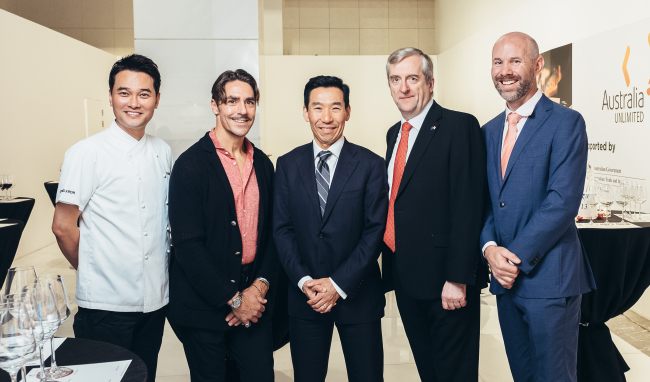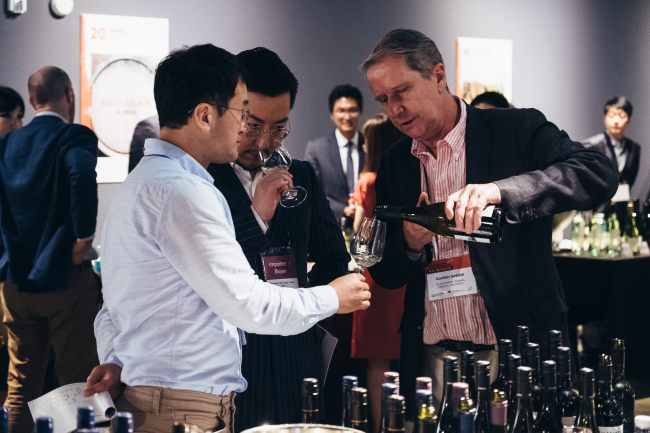Australia’s sustainably produced wines, food hit Korean market
By Joel LeePublished : Sept. 10, 2018 - 16:22
Across Australia’s vast territory, wine, dairy products, wheat, barley, beef and mutton are produced under world-leading sustainable practices and stringent quarantine policies.
The country’s low population density also ensures that these products are free from the bulk of agricultural pests, diseases and contaminants.
The nation’s popular wines were featured at the Australian Wine Grand Tasting 2018 event at Le Meridien Hotel in Seoul on Thursday. The annual event was hosted by the Australian Trade and Investment Commission in Korea (Austrade Korea) and Wine Australia.
More than 270 wines from 32 exhibitors, including 12 wineries new to the market, showcased their products for Korean buyers and the media.
The country’s low population density also ensures that these products are free from the bulk of agricultural pests, diseases and contaminants.
The nation’s popular wines were featured at the Australian Wine Grand Tasting 2018 event at Le Meridien Hotel in Seoul on Thursday. The annual event was hosted by the Australian Trade and Investment Commission in Korea (Austrade Korea) and Wine Australia.
More than 270 wines from 32 exhibitors, including 12 wineries new to the market, showcased their products for Korean buyers and the media.

A highlight of the event was a tasting seminar by Australian Master of Wine Ned Goodwin, who explained the nation’s contemporary wine varieties and drinking tips.
Edward Kwon, a Korean celebrity chef at Le Meridien restaurant Lab XXIV, presented dishes such as beef carpaccio with oyster mayo, Aussie meat pie, braised lamb shoulder and beef-lamb cutlet, which were served with different wines.
“Australian winemakers are at the cutting edge of winemaking. Our wines reflect Australia’s varietal, stylistic and regional diversity, scientific innovation and pursuit of excellence,” Australian Ambassador James Choi said. “Over 2,400 wineries in South Australia, New South Wales, Western Australia, Canberra and Tasmania, among other states and cities, produce their own unique and exciting array of wines.”
In conjunction with the event, Austrade published Australian Food and Beverage Directory 2018, which provides in-depth information on wines and other alcoholic beverages, raw ingredients, meat and seafood, horticulture, vegetables, fruits, nuts, dairy products, honey, confections, health and food supplements and other retail products. Information on Australian-branded restaurants in Korea are also included.
According to Amanda Hodges, a senior trade and investment commissioner at Austrade, the Australia-Korea free trade agreement removed tariffs and other barriers to bilateral trade when it entered into force Dec. 12, 2014, significantly boosting wine exports from Australia. The two countries recorded $35.5 billion in trade for 2016-17, she said.
Australian wine exports to Korea increased nearly 25 percent in value from July 2017 through June 2018, according to Wine Australia, indicating growing consumer demand for premium brands.
“Korean consumers have a sophisticated palate for food and beverages, including wine. The increase in Australian wine sales and the number of new entrants reflect Korean consumers’ demand for a wider range of Australian wines. It is also an outcome of the continuous promotional efforts made in Korea by the Australian and Korean wine industry since 2014,” said Hodges.

Australia is the third-largest exporter of food and agricultural products to Korea, right behind the United States and China.
“The increase in trade is a reflection of our free trade agreement, which has opened up opportunities on both sides,” Choi said. “Our wines are now much more competitive compared to those of other exporting countries. And this is reflected in the record-breaking import achieved last year -- 2.6 million liters at $12.3 million.”
As a major producer of livestock products, such as cattle, sheep, poultry and milk, as well as wheat and horticulture, Australia offers the highest-quality assurance standards in food and agribusiness production and processing, he said.
“Australia’s geographical proximity and competitive advantages make us a natural supplier of processed and fresh food exports to Korea. Our exporters are well-positioned to supply Korea all year around through counter-seasonal production.”
The participating exhibitors, both currently exporting to Korea as well as those seeking to export from Australia, were Allied Young, BK Trading, Cave de Vin, Colico Co. Limited, Dongwon Wineplus, Enoteca Korea, HiteJinro, Kaja Wine & Spirits Trading, Keumyang International, LB Wine, Les Vins de Maeil, Muhak Liquor Trade, Mundovino, My Wines, Nara Cellar, Shindong Wine, VinoKims, Vital Wine, Winell, Y. Brothers Co., Angove Family Winemakers, Craneford Winery, Diva Australia, Great Australian Wine Co., Greenock Estate Wines, Hickinbotham, Hither & Yon, Kaesler Wines, Philip Shaw Wines, Shadowfax Winery, Voyager Estate, Yering Station, Mount Langi Ghiran and Xanadu Wines.
By Joel Lee (joel@heraldcorp.com)








![[KH Explains] How should Korea adjust its trade defenses against Chinese EVs?](http://res.heraldm.com/phpwas/restmb_idxmake.php?idx=644&simg=/content/image/2024/04/15/20240415050562_0.jpg&u=20240415144419)










![[Today’s K-pop] Stray Kids to return soon: report](http://res.heraldm.com/phpwas/restmb_idxmake.php?idx=642&simg=/content/image/2024/04/16/20240416050713_0.jpg&u=)